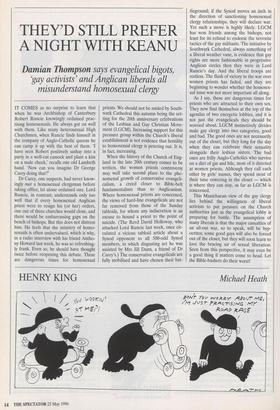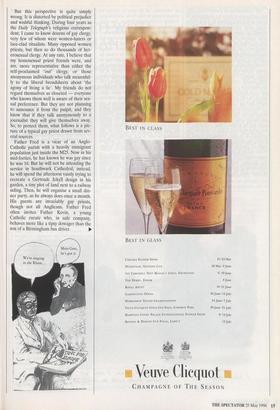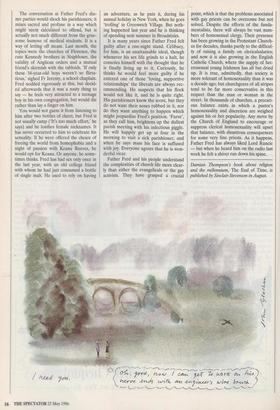THEY'D STILL PREFER A NIGHT WITH KEANU
Damian Thompson says evangelical bigots, 'gay activists' and Anglican liberals all misunderstand homosexual clergy
IT COMES as no surprise to learn that when he was Archbishop of Canterbury Robert Runcie knowingly ordained prac- tising homosexuals. He always got on well with them. Like many heterosexual High Churchmen, when Runcie finds himself in the company of Anglo-Catholic queens he can camp it up with the best of them. 'I have seen Robert positively sashay into a party in a well-cut cassock and plant a kiss on a male cheek,' recalls one old Lambeth hand. Now can you imagine Dr George Carey doing that?'
Dr Carey, one suspects, had never know- ingly met a homosexual clergyman before taking office, let alone ordained one. Lord Runcie, in contrast, understands only too well that if every homosexual Anglican priest were to resign his (or her) orders, one out of three churches would close, and there would be embarrassing gaps on the bench of bishops. But this does not distress him. He feels that the ministry of homo- sexuals is often undervalued, which is why, in a radio interview with his friend Antho- ny Howard last week, he was so refreshing- ly frank. Even so, he should have thought twice before reopening this debate. These are dangerous times for homosexual priests. We should not be misled by South- wark Cathedral this autumn being the set- ting for the 20th anniversary celebrations of the Lesbian and Gay Christian Move- ment (LGCM). Increasing support for this pressure group within the Church's liberal establishment is not evidence that hostility to homosexual clergy is petering out. It is, in fact, increasing.
When the history of the Church of Eng- land in the late 20th century comes to be written, the women priests controversy may well take second place to the phe- nomenal growth of conservative evangeli- calism, a creed closer to Bible-belt fundamentalism than to Anglicanism. Where homosexual priests are concerned, the views of hard-line evangelicals are not far removed from those of the Sunday tabloids, for whom any indiscretion is an excuse to hound a priest to the point of suicide. (The Revd David Holloway, who attacked Lord Runcie last week, once cir- culated a vicious tabloid article about a Synod opponent to all 500-odd Synod members, in which disgusting act he was assisted by Mrs Jill Dann, a friend of Dr Carey's.) The conservative evangelicals are fully mobilised and have chosen their bat- tleground; if the Synod moves an inch in the direction of sanctioning homosexual clergy relationships, they will declare war. Yet such a move is highly likely. LGCM has won friends among the bishops, not least for its refusal to endorse the terrorist tactics of the gay militants. The initiative by Southwark Cathedral, always something of a liberal weather vane, is evidence that gay rights are more fashionable in progressive Anglican circles then they were in Lord Runcie's day. And the liberal troops are restless. The flush of victory in the war over women priests has faded, and they are beginning to wonder whether the homosex- ual issue was not more important all along.
As I say, these are dangerous times for priests who are attracted to their own sex. They now find themselves at the top of the agendas of two energetic lobbies, and it is not just the evangelicals they should be worried about. LGCM instinctively divides male gay clergy into two categories, good and bad. The good ones are not necessarily out of the closet, but they long for the day when they can celebrate their sexuality alongside their lesbian sisters. The bad ones are frilly Anglo-Catholics who survive on a diet of gin and bile, most of it directed at women priests. Although they call each other by girls' names, they spend most of their time cowering in the closet — which is where they can stay, as far as LGCM is concerned.
This Manichaean view of the gay clergy lies behind the willingness of liberal activists to put pressure on the Church authorities just as the evangelical lobby is preparing for battle. The assumption of many liberals is that the major casualties of an all-out war, so to speak, will be hyp- ocrites; some good gays will also be forced out of the closet, but they will soon learn to love the bracing air of sexual liberation. Seen from this perspective, it may even be a good thing if matters come to head. Let the Bible-bashers do their worst! But this perspective is quite simply wrong. It is distorted by political prejudice and wishful thinking. During four years as the Daily Telegraph's religious correspon- dent, I came to know dozens of gay clergy, very few of whom were women-haters or lace-clad ritualists. Many opposed women priests, but then so do thousands of het- erosexual clergy. At any rate, I believe that my homosexual priest friends were, and are, more representative than either the self-proclaimed 'out' clergy, or those anonymous individuals who talk mournful- ly to the liberal broadsheets about 'the agony of living a lie'. My friends do not regard themselves as closeted — everyone who knows them well is aware of their sex- ual preference. But they are not planning to announce it from the pulpit, and they know that if they talk anonymously to a journalist they will give themselves away. So, to protect them, what follows is a pic- ture of a typical gay priest drawn from sev- eral sources.
Father Fred is a vicar of an Anglo- Catholic parish with a heavily immigrant population just inside the M25. Now in his mid-forties, he has known he was gay since he was 16. But he will not be attending the service in Southwark Cathedral; instead, he will spend the afternoon vainly trying to recreate a Gertrude Jekyll design in his garden, a tiny plot of land next to a railway siding. Then, he will organise a small din- ner party, as he always does once a month. His guests are invariably gay priests, though not all Anglicans. Father Fred often invites Father Kevin, a young Catholic curate who, in safe company, behaves more like a tipsy dowager than the son of a Birmingham bus driver. The conversation at Father Fred's din- ner parties would shock his parishioners; it mixes sacred and profane in a way which might seem calculated to offend, but is actually not much different from the grue- some humour of medical students. It is a way of letting off steam. Last month, the topics were the churches of Florence, the cute Kennedy brothers in Neighbours, the validity of Anglican orders and a mutual friend's skirmish with the tabloids. 'If only these 16-year-old boys weren't so flirta- tious,' sighed Fr Jeremy, a school chaplain. Fred nodded vigorously at this, but decid- ed afterwards that it was a nasty thing to say — he feels very attracted to a teenage boy in his own congregation, but would die rather than lay a finger on him.
You would not guess it from listening to him after two bottles of claret, but Fred is not usually camp ('It's too much effort,' he says) and he loathes female nicknames. It has never occurred to him to celebrate his sexuality. If he were offered the choice of freeing the world from homophobia and a night of passion with Keanu Reeves, he would opt for Keanu. Or anyone, he some- times thinks. Fred has had sex only once in the last year, with an old college friend with whom he had just consumed a bottle of single malt. He used to rely on having an adventure, as he puts it, during his annual holiday in New York, when he goes 'trolling' in Greenwich Village. But noth- ing happened last year and he is thinking of spending next summer in Broadstairs.
It is many years since Father Fred felt guilty after a one-night stand. Celibacy, for him, is an unattainable ideal, though whenever his sex life grinds to a halt, he consoles himself with the thought that he is finally living up to it. Curiously, he thinks he would feel more guilty if he entered one of those 'loving, supportive relationships' the liberals are always rec- ommending. He suspects that his flock would not like it, and he is quite right. His parishioners know the score, but they do not want their noses rubbed in it, nor do they want anything to happen which might jeopardise Fred's position. `Farve', as they call him, brightens up the dullest parish meeting with his infectious giggle. He will happily get up at four in the morning to visit a sick parishioner, and when he says mass his face is suffused with joy. Everyone agrees that he is won- derful vicar.
Father Fred and his people understand the complexities of church life more clear- ly than either the evangelicals or the gay activists. They have grasped a crucial point, which is that the problems associated with gay priests can be overcome but not solved. Despite the efforts of the funda- mentalists, there will always be vast num- bers of homosexual clergy. Their presence has been growing in the Protestant Church- es for decades, thanks partly to the difficul- ty of raising a family on clericalsalaries; and now it is also growing in the English Catholic Church, where the supply of het- erosexual young Irishmen has all but dried up. It is true, admittedly, that society is more tolerant of homosexuality than it was a decade ago; but churchgoers of all stripes tend to be far more conservative in this respect than the man or woman in the street. In thousands of churches, a precari- ous balance exists in which a pastor's homosexuality and discretion are weighed against his or her popularity. Any move by the Church of England to encourage or suppress clerical homosexuality will upset that balance, with disastrous consequences for some very fine priests. As it happens, Father Fred has always liked Lord Runcie — but when he heard him on the radio last week he felt a shiver run down his spine.
Damian Thompson's book about religion and the millennium, The End of Time, is published by Sinclair-Stevenson in August.




























































 Previous page
Previous page